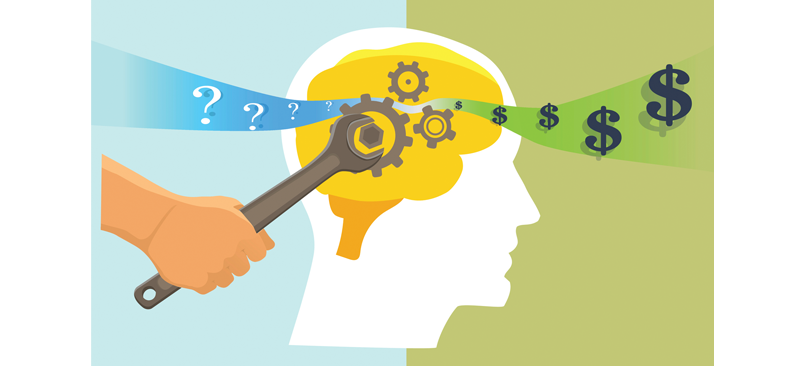Newton, Social Media, and Bitcoin: Human Behavior and Investment Decisions

Constructing financial projections involves hard data and analytics to optimize one’s situation. But to plan well in any endeavor, it should be understood that human behavior has a significant impact on future results.
Have you ever made a decision, and upon reflection, wondered why you made the choice you did? Researchers have identified why we act as we do and why we are drawn to make decisions, good or bad. The research may be new, but the phenomenon is not.
Take the case of Sir Isaac Newton and the South Sea Company1. The South Sea Company received a monopoly from the English government on trading with the emerging markets of the day. In 1720, the company’s stock rose precipitously. Newton was an early investor who doubled his initial investment in months. He liquidated his holdings happily, but the rise of South Sea Company stock continued, tripling from the price at which he exited. Friends of Newton’s stayed invested and continued to enjoy the expansion of their wealth as he fretted on the sidelines. Unable to bear watching others reap incredible gains, Newton bought back in at just about the height of South Sea Company’s value and subsequently lost nearly his entire savings. This experience led to one of Newton’s famous quotes, “I can calculate the movement of heavens, but not the madness of men.”
Or, consider today’s social media impact. In late 2017, Sean Parker, original president of Facebook, spoke in an interview with Axios2 and explained, "The thought process that went into building these applications, Facebook being the first of them, ... was all about: 'How do we consume as much of your time and conscious attention as possible?'" "And that means that we need to sort of give you a little dopamine hit every once in a while, because someone liked or commented on a photo or a post or whatever. And that's going to get you to contribute more content, and that's going to get you ... more likes and comments." In an earlier interview, Parker posited "If you're an app, how do you keep people hooked? Turn yourself into a slot machine.”
What do these two stories have in common? Sir Isaac Newton was consumed with the thought of missing out. Consumers of social media are obsessed with the notion of missing out. This behavior has long been known as Fear of Regret. In the last decade, the term for it has been coined Fear of Missing Out or FOMO.
Fear of Missing Out is the apprehension that one is not “in the know” or is “out of touch” and that others have an advantage over them in social experiences, events, and opportunities. They don’t know what they may be missing out on, but the possibility produces a level of anxiety because they think others may be gaining, winning, or enjoying themselves more.3
2017 had its own South Sea Company story. That story was bitcoin. As the price of bitcoin4 made an incredible run through 2017, articles about bitcoin flooded the news cycle, causing more and more people to fall prey to FOMO. Bitcoin’s price crossed $1,000 on January 1, 2017. The price of bitcoin peaked on December 18, 2017, at $19,498. As of this writing, bitcoin’s price sits below $8,000. Knowing nothing about bitcoin, but feeling the pull of what others might know, many now sit in Sir Isaac Newton’s company, unfortunately, wondering “What did I just do?!”5
There is something profound about the difference between Fear of Missing Out and actually missing out. The Fear of Missing Out is much more devious. It can’t be defined. It creeps in, and it spreads, and in that regard, it is a path to madness. Though a bit dramatic, think about the waste of time, and likely, poor decisions made based on a fear that someone else knows something, has something, or is about to get something you don’t have. That’s insidious.
It is not easy to fight FOMO. We are just now starting to reflect on the impact social media applications have on us. Additionally, there is a media industry built on a 24-hour news cycle devised to keep you hooked.
How do I identify FOMO in clients? It may present itself in statements like, “I have to get some Bitcoin,” “I need to own more Apple,” “Nothing can stop Tesla,” and, “A guy on TV said...” It can also show itself in the opposite context with the use of words like “collapse,” “devastating,” “plunge,” and “crash.”
My work with clients in this regard is an approach that involves as much objectivity as possible. We answer the right questions and reference them during periods of uneasiness or turbulence. We make decisions based on years, not days or weeks. And, I counsel clients to measure themselves against their own goals, not what anyone else “might” be doing. Without a process like this for financial decisions, you may fall prey to emotional influences, and that is rarely good for you.
Sources:
1 The South Sea Bubble of 1720
2 Sean Parker: Facebook was designed to exploit human "vulnerability"
3 JWT Intelligence May 2011
4 BTC Price Index and Live Chart — CoinDesk 20
5 CoinDesk Bitcoin Price Index (BPI)
Author: David Jeter, CFP® | Partner and Financial Advisor | Allegheny Financial Group | February 2018
Allegheny Financial Group is a Registered Investment Advisor. Securities offered through Allegheny Investments, LTD, a registered broker/dealer. Member FINRA/SIPC.